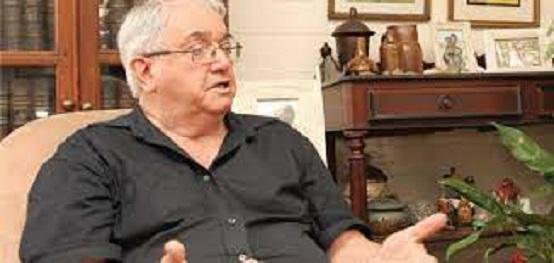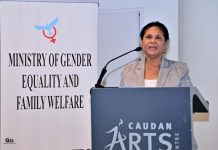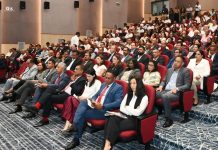Africa-Press – Mauritius. Here we are again, as in the months preceding the December 2014 elections, with the discussions between the Government in place and the MMM on electoral reform, as a prelude to what should undoubtedly follow: the terms of an alliance between these two gone.
The latest news informs us that we would be in “off” mode right now, but it will surely resume until they agree. How do you read these political negotiations?
Yvan Martial: The less our press, so insightful, will speak and give importance to these interminable negotiations, the better off we will be. Let’s finally be adults and no longer children still enjoying fairy tales and other tall tales.
We have, rightly or wrongly, favored an MSM-PMSD-ML alliance. The blue barnyard has since deserted this pleasure wagon for reasons only known to it. What remains of this alliance, having changed drivers along the way, must now complete its mandate, if it is able.
Let’s be patient. Let’s wait at least for the dissolution of our National Assembly 2014-2019/20, to start looking at the form of the starters for the next electoral game, the possible combinations of alliances for what it is still worth.
Above all, let’s not try to give any importance to such politico-electoral insignificance. Let us ask ourselves more judiciously what Delhi and Beijing want our Country Mauritius to become, to better serve their interests, in the middle of the Indian Ocean, not the Indian Ocean for nothing.
The naive and other simpletons are passionate about the contortions of the puppets. The most discerning are concerned with the intentions, avowed or unavowed, of the puppeteers.
Are we candid enough stupid to swallow any window dressing? Do not count on me to calculate the electoral chances of nags still in training, without knowing who will ride them, for which stables will they run, which colors will they defend and who will serve more instead of serving themselves greedily?
* Do you see in the current negotiations the same motivations that had animated the main protagonists in December 2014, that is to say the leaders of the PTr and the MMM respectively, and do you think that this little political game will meet the same fate? than the team that faced L’Alliance Lepep during the last legislative elections?
What could be more disgusting than to see a wandering dog swallowing his vomit so as not to lose the slightest bit or piece? In order not to change, our parties and politicians spend the best of their time between two electoral contests exchanging the most cruel invectives, vomiting on each other, taking the admirable people to witness.
Then suddenly… A veritable sleight of hand… They want us to believe that the angels have become demons and the devils have become cherubs. I cannot prevent certain colleagues from granting significance to these “longanist politicians”.
I pity their lack of insight. Above all, I pity their readers who have to content themselves with these stale and rancid macatias. I have always believed that information, especially media information, is what is new, if not hidden, what we do not want the population to learn and discover.
I especially pity the editorialists who have only this stale and moldy bread to comment on, to dissect, to give it a semblance of a new appearance, if not rancid bait.
I made my mourning for political trickery, especially electoral tricks. Fortunately, there are parties that have never or almost never deviated, remaining faithful to their initial ideal.
I am thinking more particularly of Lalit and Jack Bizlall. We can still vote usefully. We can still not regret having voted for imposters again. * Would it be desirable for there to be a fight of three or four at the end of the next legislative elections to make things clearer and to put an end to these unnatural alliances?
In any Parliament, there are only two camps, if we abstain from considering those who abstain. There is the yes side and the no side. An electoral struggle of three or more is not impossible but risky because a majority of voters prefer, even wrongly, to simplify the debate, by not encumbering themselves with minor formations.
Our electoral system, The First Past The Post, wants this, requires this. It did not fall to us from the sky for free. It is the work, perhaps Machiavellian, of the most powerful political party of the 1950s/60s that the Englishman British born, a divisionist to better reign even after his departure (theft and concealment of the Chagos, for example), covered indulgence.
We can imagine other electoral systems, including one favoring total proportional representation, resulting in a heterogeneous Parliament, composed of multiple tendencies and yet manageable if the one acting as head of government presents consensual bills, thanks to the widest possible consultation with the parties concerned.
Obviously this is a Herculean task, practically impossible for a single man to achieve, even a consensual Prime Minister. However, this can be done if he knows how to delegate his powers to others, including political opponents who are passionate about this or that new legislation.
There is always a way to do something new even with old but proven legislation. Our politicians often make an impassable mountain of this three-quarters majority, supposedly essential to reform our electoral system.
The fault cannot lie with the electorate which, on five occasions, in particular in 1982, 1991, 1995, 2000, 2014, granted an overly dominant alliance such a majority which, in the spirit of the founding fathers, the sorcerer’s apprentices , having conceived it, was to occur only exceptionally.
The electoral score envisaged by them as having to be the usual norm (about 40 deputies for the government majority and about 20 for the opposition) occurs only five times (1967, 1983, 1987, 2005, 2010).
Our electorate, much more surprising than expected, even gives another result that can be considered exceptional, namely a score at parity or almost (30 against 30), as in 1976, leaving it to the two Rodriguan deputies to tip the scales in a one way or the other.
What to imagine a possible Prime Minister coming from constituency No 21… Since we are talking about Rodrigues, we can add that this constituency illustrates well the possibility of a regional force independent of the two major parties or alliances in the rest of the island.
Cehl Meeah proved to be able to do practically the same thing at Nos 2 and 3. UDM could try the adventure in 1976 at Nos 17, 18 and 20. There is still the Hurdoyal phenomenon at Flacq (No 9) in 2014.
Let’s not jump to the conclusion that the dice are loaded from the start. Any election can reveal its share of surprises. In 2014, a 60-0 majority in favor of the PTr-MMM (40% + 40%) ends in a surprising 0-60 or so in favor of the MSM-PMSD-ML truck.
* In the context of these debates on electoral reform, we speak these days of ethnic census, a dose of proportional representation, redrawing of districts, etc.
What, in your opinion as a citizen of the Republic of Mauritius, should concern us more in relation to political representation and the political thing itself?
There is endless nitpicking about ethnic enumeration, proportional representation, redistricting, simply because we are taking electoral reform the wrong way.
What do we actually want when we call for electoral reform? The answer must be a Parliament that responds to the expectations and aspirations of the electorate and that is capable of ensuring not only material and physical but also moral and spiritual progress of the population.
Therefore, I ask the following question: what are the main tasks of any parliament? It’s already picking up. Before the Republic, we had a Legislative Assembly, favoring the parliamentary obligation to constantly update the Legislation in force in the country. Do we only need elected deputies to do this? Not necessarily.
A team of experienced lawyers can very well and better ensure the technical part of this constant legislative updating, even if it means having recourse to elected deputies in the event of major disagreement or even the need for the representatives of the People to tilt the balance in one direction.
or in the other. Some will thunder against this government of magistrates, of technocrats. Let’s concede this but point out that the status quo is just as worrying.
What is the percentage of MPs and even ministers who can practically, unexpectedly, find the always possible flaws in a bill, sometimes with unfortunate consequences, ridiculing the parliamentary body.
Since the Republic of 1992, we have been entitled to a National Assembly which seems to want to add the mission of leading the country soundly to the more specifically legislative task of any Parliament.
The need to entrust our best lawyers with the task of updating and adapting our Legislation to a world which is above all external and in perpetual evolution and movement, if not a maelstrom (think, for example, of the present planetary information system, instantaneous or almost but which is becoming more and more like a Big Brother system, perhaps allowing a candidate sponsored by Moscow to become the president of the all-powerful United States of America) is not restricted only to the legislative field but s extends to other spheres of our social and economic activities.
Here too, as elsewhere, our deputies and ministers have every interest in co-opting the best skills that they do not necessarily possess or by the sole virtue of an election that does not always enjoy a guarantee of infallibility.
Such co-option has multiple advantages. Let us say briefly, for example, that it promotes the promising involvement of a greater number of goodwill in a national process of integral development in truth and in fullness of our Mauritian society. The final decision is of course up to the majority in the National Assembly.
The widest co-optation only favors that this supreme parliamentary decision be taken on a better holistic knowledge of a given problem, with better chances of consensual acceptance because public opinion will know that it is the result of a wide consultation.
, rather than a scullery decision, with unavowable interests, camouflaged behind alleged state secrets or confidentiality, with decidedly good backs. No good electoral reform if we stick only to legislative elections. They are only one aspect of a truly vibrant democracy in a given country.
By placing all or almost all the powers in the hands of 25 ministers, we are concentrating a massive but toxic dose of desires and often disproportionate ambitions. To be a minister or nothing at all: It’s a demonic dream.
Safety valves should be widened by giving more administrative and decision-making powers to regional elected officials, mainly our mayors and district presidents, pending the long overdue creation of municipalities in the surrounding localities and agglomerations of several tens of thousands of inhabitants.
It is unacceptable that they go daily to places like Triolet, Goodlands, Rivière-du-Rempart, Centre-de-Flacq, Bel-Air/Rivière-Sèche, Saint-Pierre, Mahébourg, Rose-Belle, Rivière-des- Anguilles, Chemin-Grenier, Rivière-Noire, Bambous-Médine, without giving the slightest importance to the presidents of these villages, not having in the eyes of the law and the administration any administrative powers other than those of a locality of a few hundred votes.
Let us reform our laws and regulations, to electoral needs, so that our mayors, presidents of districts, those of neighboring localities and agglomerations of several tens of thousands of inhabitants, can act, certainly within certain limits to be defined, like the Prime Minister of the territory under its jurisdiction, so that they have a say as soon as an aspect of the daily life of their constituents is threatened in one way or another.
That they become a significant part of any solution to any new problem, thanks to their knowledge of the field, local action, permanent presence, easy contacts with the components of a given regional population.
Our urban municipalities of a hundred thousand inhabitants and administered are perhaps too large to allow administration, animation, conviviality. Let us have the honesty to admit that too often the problems of city centers and those of the suburbs are not the same and require different solutions.
Who will we make believe that the problems of Vallée-des-Prêtres or Roche-Bois are the same as those of Pailles or Pointe-aux-Sables, if not of the city center?
Instead of stifling these suburban frustrations, let’s give ourselves a new breath, a new breath of fresh air, by creating new municipalities in Roche-Bois, Sainte-Croix, Terre-Rouge, Pailles, GRNO, Stanley, Coromandel, Palma , Glen-Park, Camp-Fouquereaux.
Let’s separate Phoenix from Vacoas, and Beau-Bassin from Rose-Hill. But above all that these new mayors and district presidents be elected for their entire term of office, just as we are already doing for our Prime Minister.
One more word on the need to reinvent a new electoral division but respecting the current one as much as necessary, having the merit of being familiar to the entire population.
It seems indisputable that the previous electoral district cutters had in front of them a map of Mauritius which did not insist enough on the constraints due to the relief of the island, otherwise they would not have been stupid enough to associate Vieux-Grand-Port in Rose-Belle and Plaine-Magnien in Mahébourg, or even demanding that the inhabitants of Cité Kennedy vote for a candidate residing in Suriname, when a resident of Palma votes for Quatre-Bornes…
Let’s redo our 20 constituencies of three deputies (let’s remember this figure familiar to all) but by carrying out a concentric redistricting, taking as a central point and a diameter of the number of kilometers that must be suitable in each case, the following localities: GRNO, Plaine-Verte, Roche-Bois/Baie-du-Tombeau, Terre-Rouge, Triolet, Goodlands, Rivière-du-Rempart, Centre-de-Flacq, Saint-Pierre, Bel-Air/Rivière-Sèche, Mahébourg, Rose-Belle, Suriname, Black River, Vacoas, Phoenix, Curepipe, Quatre Bornes, Rose-Hill, Petite-Rivière.
These concentric circles will overlap in some cases. Let’s do as for the maritime economic zones of 200 kilometers, and that a segment separates them equidistant.
Allow our Electoral Commission while it still enjoys the confidence of the population to examine the requests of such and such neighboring locality, preferring to be attached to such electoral center rather than another.
Let us legislate that any group of three candidates for a party or alliance must consist of persons of both sexes and that one of the three must be under the age of 35.
Let us finally allow our Electoral Commission, always for the same but present reasons, to regulate and correct, in its wisdom, any insufficient ethnic or religious representation, within any new National Assembly, until this apprehension of a another century fades by itself.
Let us dare to trust citizens above all suspicion, even if they do not enjoy any plebiscite but general confidence, fortunately not limited to a single electoral mandate.
Fortunately, there are not only our sixty deputies and ministers to do everything in Mauritius. They are powerful but not almighty. They are not the only ones working and working well, day after day, without being able to enjoy endless parliamentary holidays.
Even God needs men… Something to meditate on… * But to follow what is happening these days with regard to the negotiations on the electoral reform project, do you have the impression that politicians are turning everything upside down for very partisan considerations?
They’ve been doing just that since 1983. How it’s gotten worse since then! We see no hope for change. We are condemned to live with this scourge. Hopefully it won’t be forever. Let’s not despair, however. . . Other peoples are more unhappy than us because they are even worse off. . .
* if there must be electoral reform, to satisfy the “pronouncement” of the United Nations Human Rights Committee on our electoral system but also to correct its dysfunctions, is it up to politicians to propose such a project policy with constitutional implications?
We must return to the ancient notion of a sovereign state that can do what its main leader may have as a new fad, such as setting up impassable barriers at the borders. Let us opt for a single planetary Humanity with a wise universal government but with the necessary binding powers.
We know what the United States is capable of, but under the rule of a dangerous megalomaniac… The United Nations is interfering in a consensual arrangement between Mauritians, hardly preventing us from sleeping on our two ears.
This jams the government in place, which only inherits a sloppiness dating back to the racial fights of January 1968 suddenly demolishing the fragile balance designed by Banwell, the well-named, and the like.
There is already a solution to this problem: candidates can be exempted from the humiliating pre-election declaration of publicly declaring what sets them apart.
At the same time, they lose their right to obtain a corrective seat granted in such an infamous way. We cannot have the butter, the silver of the butter and in addition the heart of the creamer.
What prevents us from making this provisional definitive and thus reassuring, with a bit of luck, these shopkeepers of the United Nations that it would be better to ensure the strict application of the innumerable sanctions taken against the State of Israel so Hitlerian, in favor of the martyred Palestinian people.
If our politicians, especially those in Cabinet, do not have the time or the intelligence to solve this problem quickly, then let them entrust this task to non-politicians more competent and intelligent than them!
* Also, how do you react to the allegations of racial discrimination that we hear these days? Allegations that have been launched as part of the work of the Committee on the Elimination of Racial Discrimination and the conclusions of which would give the impression that there is a great conspiracy to discriminate against a section of the population…
Discrimination against Mauritians of color of African descent has always existed in Mauritius. It is the result of various oligarchies having, like the most venomous snakes, changed skin over the centuries. Not so unfortunately for their victims.
Lislet Geoffroy, bastard, son of a slave, owes only to his keen intelligence and great competence to have occupied the highest positions under various governments (Ancien Régime, revolutionary government, Napoleonic, English, both in Mauritius and in the meeting).
Suspect is the death of Rémy Ollier at the age of only 28. He was getting cumbersome with his ideas, so revolutionary for his time. Example: claim a municipality for Port-Louis.
The oligarchs of today refuse the same municipal favor to the inhabitants of Triolet, Goodlands, Centre-de-Flacq, Mahébourg, Rose-Belle, Chemin-Grenier.
Always the same oligarchic argument: “Don’t put your razor in your hand, your zacot”. Lanougarède beats De Plevitz in front of the Central Post Office.
He becomes a hero for having corrected the friend and defender of Indian agricultural workers, engaged in the service of the sugar industry, if not to save it.
The retrocession of Maurice to France, wanted among others by men of color (Rivet, Curé), will be stricken with the threat of sedition, consequently of treason, by British Born, at the request of oligarchs, having rupees at the place of the eyes.
Today, we make sure that no descendant of Africans goes to dirty the clear water of a pool reserved for more equals than others. Always this curse of not having the right birth certificate… Why do you want those, who profit from such an odious system, to correct a situation that benefits them so much, to the detriment of a mass of left behind?
* There are, however, institutions such as the Equal Opportunities Commission to correct any shortcomings, criteria established at the level of the Public Service Commission and Disciplined Services Commission for recruitment into the Civil Service on the basis of merit.
What would explain this outcry, in your opinion? Call Brian Glover back and I’ll start taking the Equal Opportunities Commission seriously again. I will do the same with regard to the PSC, LGSC and DFSC, when we resume regularly publishing the Staff Lists of parastatal bodies.
They are paid, after all, with public funds, taxpayers’ money. Do we not have the right to know the names and professional qualities of our employees, of his public servants?
* There has been talk for a relatively long time of the establishment of a ‘National Employment Agency’ whose aim would be to ensure that “every citizen has access to a decent work as enunciated in Government Program 2015-2019”.
Nothing has been accomplished so far. Do you think it is high time the Government came forward with legislation, in the meantime, to ensure that bidders for government contracts are ‘Equal Opportunities Employers’ beforehand?
I don’t believe a word of all this bullshit. On the other hand, what must be proclaimed loud and clear is that every adult and responsible human being has the duty to earn an honest living and ensure that of the people in his charge.
No one has the right to expect the state, society, to do something for him. If he has an ounce of dignity, he must understand that it is his duty to contribute to the well-being of others. Let’s take an example from others.
Girls, especially mothers of several children, have enough hassle and trouble not to have, in addition, to provide for the needs, whims, follies, of an irresponsible man, especially if he agrees to become a slave to drugs.
, alcohol or other social evil. I can only advise them to manage to always be the husband in their house.
This will give them the right to chase from their homes any companion or concubine who is more cumbersome than productive. Broom and they will be happier.
What is your opinion of all these events which have dominated the news week after week in recent months: the work of the commission of inquiry into drugs and the publication of its conclusions, the hearings of the commission of inquiry into the former President of the Republic, the surprise visit of Alvaro Sobrinho to the premises of the ICAC followed by obtaining a pass for the Angolan investor, assault on police officers…?
Our newspapers and the news fortunately offer us subjects for conversation or reflection that are fortunately more entertaining and more edifying than the scandals that you take the trouble to enumerate.
Professionally speaking, I have to go into them scrupulously, but you will understand that I refuse, through my comments, to add to the gloom, threatening to make us lose all hope in the promising future of our country, the object of all our prides.
For More News And Analysis About Mauritius Follow Africa-Press







